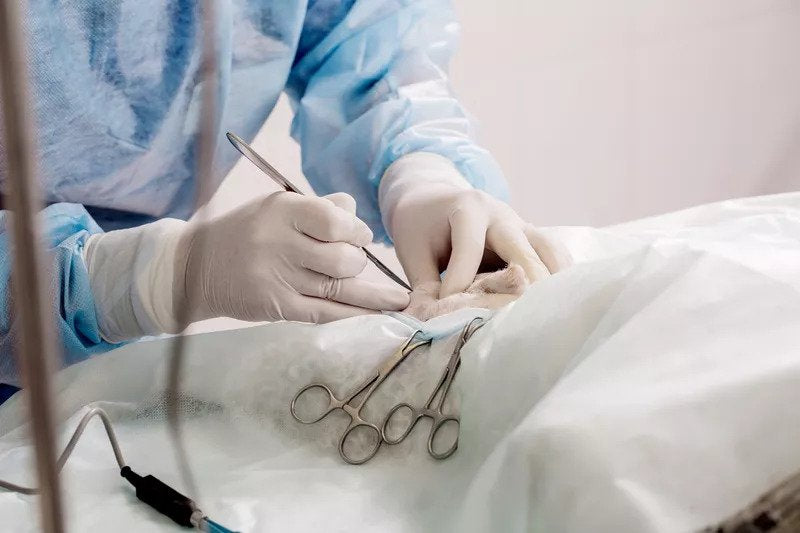Neutering is when your male dog's testicles are removed through a simple surgical procedure. It is considered a simpler surgery compared to spaying. This procedure sterilizes your male dog so that he'll be incapable of reproducing.
Neutering is performed under general anesthesia. An incision is made near the front area of your dog's scrotum, then his testicles are removed through that incision.
As there are many misconceptions about spaying (as discussed in our previous blogs), the same goes for neutering your male dog. Here, we've come up with facts about neutering, when to neuter your dog (if you've decided to), and what to expect and do after the surgery.
"An incision is made near the front area of your dog's scrotum, then his testicles are removed through that incision."
How neutering benefits your dog
Neutering your dog is a good idea for many reasons. It is common knowledge to all that the primary upside of neutering is preventing our male dogs from reproducing. But did you know that there are also a few more reasons why neutering can actually be good for your dog? Neutering your fur-baby can:
- lessen the risks of your dog from developing certain types of diseases like prostate problems and testicular cancer
- lessen the testosterone levels in his system, resulting in a calmer and more behaved dog; this can also help in the improvement of dominance-related behaviors and aggression
- decrease his marking behavior
- help him get involved in fewer fights with other male dogs (especially when there's a female dog in heat nearby)
- eliminate territorial behaviors of male dogs
- eliminate hormonally influenced aggression towards other male dogs
- decrease behaviors such as mounting at furniture and family members
- improve health outlook
- improve temperament
- decline the homeless pet population and unwanted breedings that are out of standards, destroying a specific breed's characteristics
- reduce the risk of diabetes
- lessen breed dilution to keep a dog healthy and lead to an overall better breed
- give him a longer, healthier life
- prevent your fur-baby from growing obese
- help refocus your dog's attention since intact males often pay too much attention to other dogs
- reduce the risks of perianal fistula, a painful skin disease where infected boils develop around your fur-baby's anus). It can basically appear in any dog but is most commonly seen in non-neutered male dogs, particularly with German Shepherds, Leonbergers and Irish Setters
- prevent your dog from passing on genetic problems

When should you neuter your dog
Unlike spaying that you should wait for a few months before your female dog can go through the procedure, neutering can take place after your fur-baby hits the age of eight weeks. But of course, always consult your vet as she knows what's best for your dog as there are also a lot of factors to consider like age, health condition, especially if your dog is nearing his senior years.
A neutered male is not automatically considered as sterile immediately after surgery. On average, for your fur-baby to be considered sterile, it will take around 2 to 6 weeks. This is why it's best to keep your female dogs in heat away from your male (or vice versa) to make certain that no unplanned breeding and pregnancy will take place.
Things to expect after the procedure
Just when you thought it's all over, it isn't. The hardest part (yet) is the recovery stage:
- Your dog can leave the clinic some hours after the surgery. When you arrive back home, feed your pet a small amount of meal only. His appetite probably hasn't come back yet but a bit of food can help in the recovery process and will also help him get back to his daily routines.
- Do not allow him to walk, run, play or do any strenuous activity that might affect the incision sit. If no complications occur, the average recovery time for neutering is about a week or two.
- Dog diapers are a great idea especially when your fur-baby is still having a difficult time walking and going out to potty. These diapers will also keep him clean and will save you the hassle of dealing with crazy cleanups. You can also place a pee pad under his bed or crate for that added leakage protection.
- Always check the surgery site a couple of times every day to see if it's getting better as it should. If you notice any strange discharge, foul odor, redness, or swelling, bring your fur-baby back to your vet for medical attention. These are not signs of healing, these are signs that your fur-baby's incision site is irritated or infected. Depending on the intensity of the infection, your vet may prescribe ointments and medications like antibiotics.
- As the incision site gets better, you will notice that your fur-baby will have an increased urge of licking, scratching, biting on it. To prevent this, you can let him wear an e-collar. But the problem with this is that your fur-baby will bonk at doors, tables, and furniture at home. Instead, use belly bands as a cover-up for the incision site.
- Give him multifunctional supplements that will provide him with the nutrition he needs for a full-speed recovery ahead. Multivitamin supplements for dogs can help boost your customer’s furry buddy's immune system, thereby helping them ward off diseases. It has Propriety Enzyme Blend, a wide range of vitamins, and Glucosamine HCL, plays a key role in maintaining your fur baby's overall well-being.
- You can also provide calming supplements for dogs, since the recovering stage could cause stress to your dog, as daily routines are temporarily changed. Dogs love to keep their daily routines as similar as possible every day. It contains Organic Hemp extract, which is rich in healthy fats, proteins, & antioxidants to help manage health issues, pain, inflammation, anxiety, & seizures. Organic hemp has soothing qualities to help calm your fur-baby.
"Multifunctional SoftSupps® can provide your dog with the nutrition needed for a speedy neuter recovery."

Overall, neutering your male dog is a beneficial procedure. As pet parents, we should always keep in mind that our dogs are our lifetime responsibility, and it is on us, too, for them to live a happier and healthier life.









